In today’s fast-paced educational landscape, innovative approaches are transforming the way students learn, especially in subjects that may pose challenges. Mathematics, often perceived as a complex and abstract discipline, is undergoing a metamorphosis in the hands of interactive methodologies. Enter the realm of math games designed exclusively for grade 5 students – a gateway to transforming the learning experience into a captivating and enjoyable adventure.

Beyond the realms of traditional textbooks and lectures, math games serve as the torchbearers of a new era in education. These games transcend the ordinary, breathing life into mathematical concepts through engaging gameplay, vibrant visuals, and interactive challenges. They hold within them the power to not only bolster mathematical prowess but also to awaken critical thinking, ignite problem-solving prowess, and nurture the art of strategic planning – all while fostering a genuine love for learning.
This article embarks on a journey to unearth the crème de la crème of math games tailored for grade 5 students. Each game serves as a portal into a universe where equations, fractions, and numbers come to life in a symphony of colors and interactivity. Prepare to explore a trove of 19 math games that span a spectrum of educational objectives, each designed to not only refine mathematical skills but also to create a captivating odyssey of discovery. As we delve into the intricate mechanics of these games, we unveil how they can pave the way for a thrilling learning adventure that transcends traditional education and unlocks the boundless potential of every grade 5 student.
After reading this article, you’ll get to know about:
- Why Use Math Games for Grade 5?→
- Benefits of Incorporating Math Games in Education→
- How to Integrate Math Games into the Grade 5 Curriculum→
- Top 19 Math Games for Grade 5:
- Conclusion →
Why Use Math Games for Grade 5?
Grade 5 marks a pivotal juncture in a student’s academic journey, where the foundation of core mathematical principles intertwines with the introduction of more intricate and sophisticated concepts. As young learners stand at the threshold of these multifaceted mathematical realms, math games emerge as beacons of light, casting a guiding glow on their path forward:
- These games function as an invaluable gateway, ingeniously bridging the perceived chasm between abstract theoretical concepts and the tangible realm of hands-on practice.
- They perform the dual role of educator and entertainer, nurturing not only a profound understanding of mathematical principles but also an enduring passion that transcends the boundaries of rote learning.
- As students venture into realms of decimals, fractions, algebraic equations, and geometric shapes, the interactive nature of these games infuses life into otherwise complex subjects.
The allure of exploration and discovery is interwoven into the very fabric of these games, transforming the learning experience into an exciting voyage where every answer unravels a mystery, every correct move propels them forward, and every challenge conquered fuels their thirst for knowledge.
Benefits of Incorporating Math Games in Education
Beyond their apparent role as entertainment, math games unleash a veritable whirlwind of benefits that cascade across the landscape of a student’s cognitive development. While they undoubtedly infuse learning with an element of enjoyment, their impact transcends the surface level, nurturing a profound transformation in the way students approach challenges and absorb knowledge. As each math game is conquered, the journey itself becomes a testament to resilience, teamwork, and the rewarding nature of perseverance.
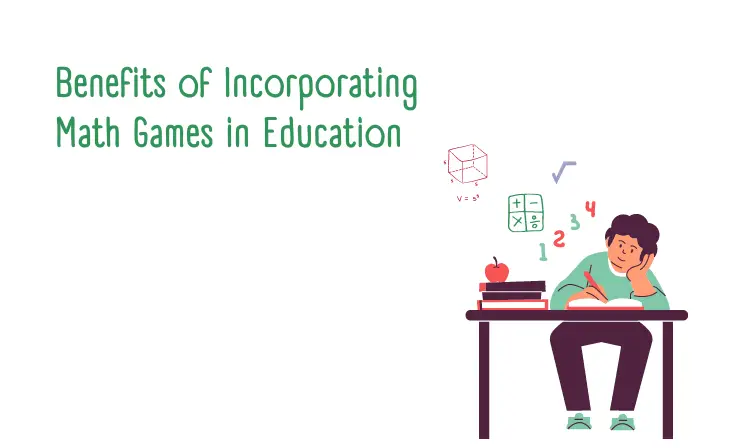
At the heart of these games lies the opportunity for collaborative learning, where students engage in friendly competition, share strategies, and collaborate to solve complex problems. The camaraderie forged in these settings lays the groundwork for future collaborations, teaching students the art of teamwork and communication – skills that prove indispensable in the interconnected world they are poised to inherit.
Perhaps most significantly, math games cultivate a mindset that thrives in the face of challenges. With each puzzle solved, students gain confidence in their ability to tackle problems head-on. The very act of navigating these games mirrors the challenges they’ll encounter in their academic journey and beyond. Strategic thinking, analytical prowess, and decision-making skills blossom as students make each calculated move. These skills are not confined to the virtual realm of the game but permeate into the fabric of their daily lives, enabling them to approach complex situations with poise and adaptability.
In conclusion, math games for grade 5 are not merely a supplement to education; they are transformational tools that equip students with the skills and mindset needed to thrive in an ever-evolving world. The lessons learned through the challenges, victories, and collaborative efforts within these games reverberate far beyond the confines of a screen, shaping students into resilient, confident, and resourceful individuals poised to conquer the complexities of the modern landscape.
How to Integrate Math Games into the Grade 5 Curriculum
The integration of math games into the grade 5 curriculum is a delicate art that requires a thoughtful blend of pedagogical insight and interactive engagement. This seamless fusion transforms conventional learning environments into dynamic arenas of exploration and growth.
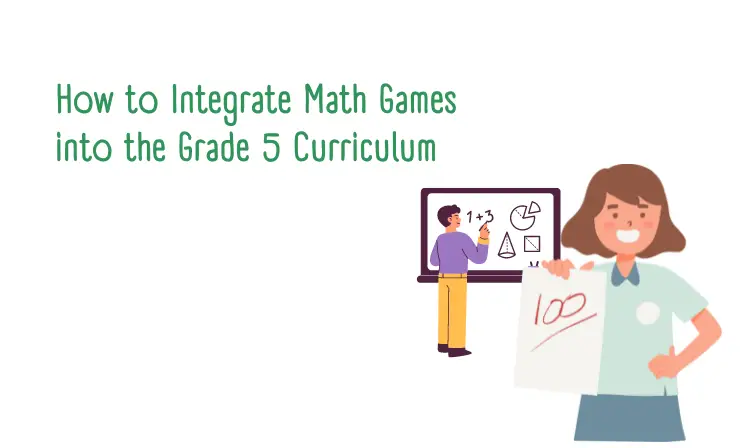
To embark on this transformative journey, educators must meticulously align the captivating allure of games with the overarching learning objectives, ensuring a harmonious convergence of entertainment and education.
Aligning Game Content with Learning Objectives

At the heart of successful integration lies the alignment of game content with the pre-established learning objectives. Each game should be strategically selected to correspond with specific topics, thereby reinforcing the very principles that underpin the curriculum. The marriage of gameplay with educational goals acts as a reinforcing agent, anchoring abstract concepts in real-life scenarios. For instance, math games addressing fractions can coincide with classroom lessons on the same topic, allowing students to grasp fractional concepts through interactive practice.
Games as Tools for Reinforcement

Math games stand as formidable allies in the realm of reinforcement. Once the groundwork has been laid in traditional classroom settings, games can be strategically deployed to solidify concepts and fortify skills. Whether it’s through solving puzzles, strategizing moves, or deciphering riddles, students are actively engaging with mathematical principles, embedding them in their memory through repeated practice. This synergistic approach cements knowledge while simultaneously kindling enthusiasm for learning.
Assessment through Gameplay
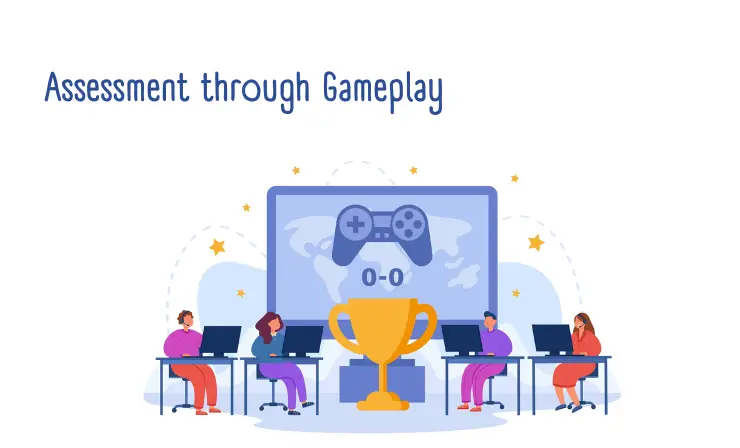
Beyond their role as teaching tools, math games harbor immense potential as assessment mediums. Instead of the conventional method of testing solely through paper and pen, games offer a dynamic alternative that measures comprehension through action. As students navigate through challenges and make calculated decisions, educators can gauge their understanding and problem-solving skills in real-time. This form of assessment not only taps into a variety of intelligences but also eliminates the anxiety often associated with traditional tests.
Igniting Curiosity through Game-based Introductions

The power of math games extends beyond mere reinforcement; they can serve as captivating introductions to upcoming topics. By offering students a sneak peek into the fascinating terrain that lies ahead, educators can ignite curiosity and anticipation. When embarking on a new mathematical chapter, starting with a game that embodies the core concepts allows students to explore and experiment before formal instruction begins. This approach transcends traditional paradigms, inviting students to take ownership of their learning journey.
Balancing Playfulness with Purpose

While the allure of games lies in their entertainment value, their integration demands a careful equilibrium between playfulness and educational purpose. Games should seamlessly interweave challenges with learning objectives, providing an environment where students eagerly embrace each obstacle as an opportunity to hone their skills. The thrill of competition and the satisfaction of unraveling puzzles should align with the satisfaction of grasping mathematical concepts and solving equations.
In this video, education researcher and interactive game developer, Ki Karou, presents a curated set of strategies based on game-based learning. The focus is on fostering students’ ability to engage in productive struggle, aiming to nurture their curiosity, tenacity, and creativity in problem-solving. The overarching objective is to empower students to become skilled problem solvers, equipped to tackle challenges with confidence and creativity.
Top 19 Math Games for Grade 5
1. Prodigy
Embark on an educational journey like no other with Prodigy. This online role-playing game transforms math into an exhilarating adventure, captivating students in a world where math questions hold the key to advancing and customizing characters. Immerse yourself in a fantastical realm where battles and quests are interwoven with math problems, seamlessly blending learning with the thrill of exploration.
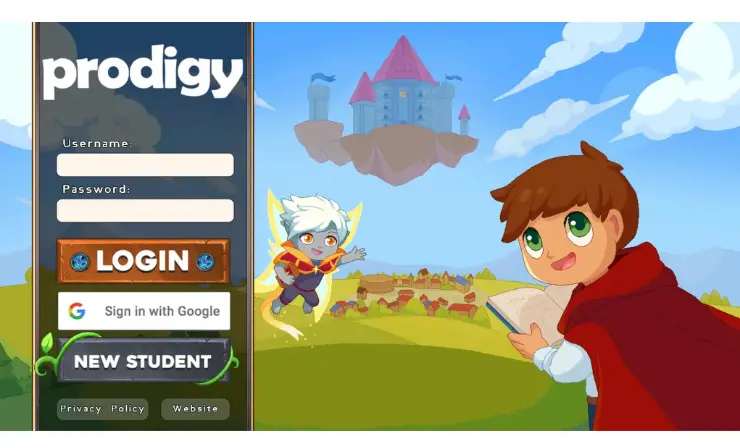
Rules: Players choose answers to math questions, casting spells and strategizing to defeat opponents.
What it develops: Prodigy isn’t just a game; it’s a portal to the development of vital skills. As players navigate through the virtual landscape, they hone problem-solving abilities, employing critical thinking to overcome challenges. The intricate dance between math questions and gameplay fosters numerical agility, enabling players to make swift, accurate decisions in the face of complex problems. Prodigy transforms math from a classroom chore to an immersive adventure, fostering a love for learning that endures beyond the game.
Thank you, thank you Prodigy! And thank you for creating a math game that my students adore! 💗
-5th grade teacher
-Chicago, IL
-3rd year teaching https://t.co/LWxoeqfbBf— Kassie Larsen (@3232_kassieee) August 2, 2023
2. Kangaroo Hop
Immerse your students in the world of geometric shapes with Kangaroo Hop. In this engaging game, players guide their kangaroo across a pond adorned with an array of differently shaped lily pads. As they make leaps and bounds, students embark on a journey of shape recognition, sharpening their ability to identify and differentiate various geometric forms.
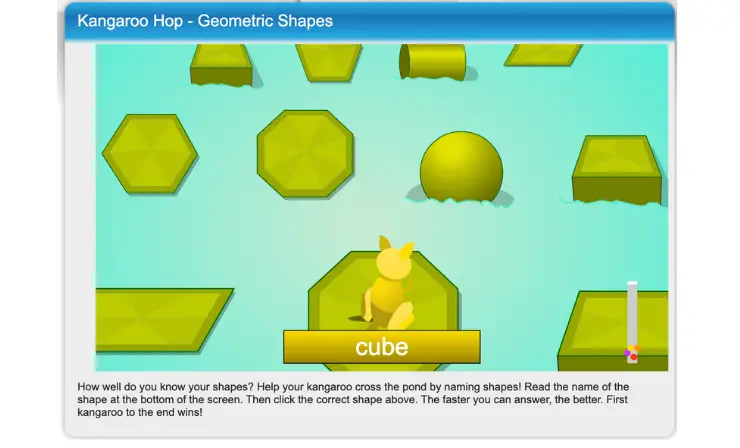
Rules: Players maneuver the kangaroo across the pond by hopping onto lily pads of different shapes. The objective is to navigate the kangaroo to each lily pad while accurately recognizing and matching the shapes. Each successful leap reinforces the player’s grasp of geometric shapes.
What it develops: Kangaroo Hop hones students’ shape recognition skills, enhancing their ability to quickly identify and categorize geometric shapes. The interactive gameplay transforms shape recognition from a theoretical concept into a dynamic and enjoyable learning experience.
3. Coolmath4Kids
Immerse students in a captivating world of mathematics with Coolmath4Kids. Boasting a comprehensive assortment of math games spanning topics like fractions, geometry, and algebra, this platform injects learning with excitement. As students navigate through interactive challenges, they simultaneously solidify the concepts taught in classrooms, creating a harmonious blend of education and entertainment.
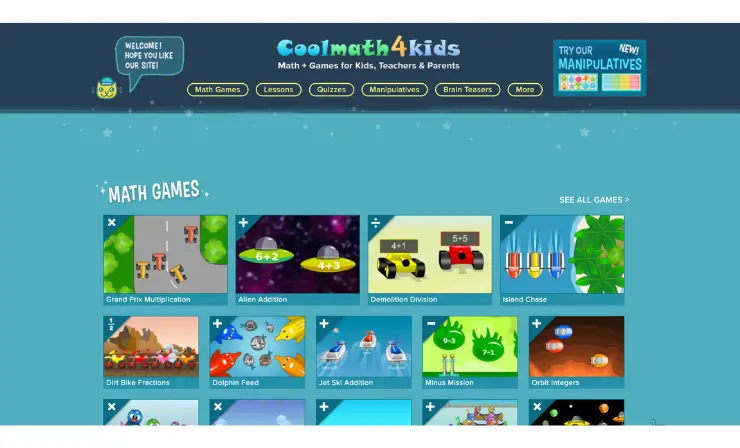
Rules: As players dive into the games, they are met with interactive challenges that beckon them to apply their mathematical prowess to solve intricate problems. Each game presents a unique puzzle that demands the application of specific math concepts, enhancing understanding through hands-on engagement.
What it develops: Coolmath4Kids serves as a dynamic vehicle for skill retention, offering students the opportunity to reinforce and internalize the concepts they’ve learned. Through these interactive challenges, students not only retain knowledge but also develop the critical ability to apply theoretical concepts to real-life scenarios. The platform crafts a bridge between theoretical understanding and practical application, nurturing a well-rounded skill set that spans across various mathematical domains.
4. SplashLearn
SplashLearn immerses students in an adaptive platform of math games. As players progress through levels by solving math problems, the game adjusts difficulty based on their performance, providing a personalized learning experience. The game’s brilliance lies in its adaptive nature, seamlessly tailoring difficulty levels to match each player’s performance, crafting a truly personalized learning expedition.
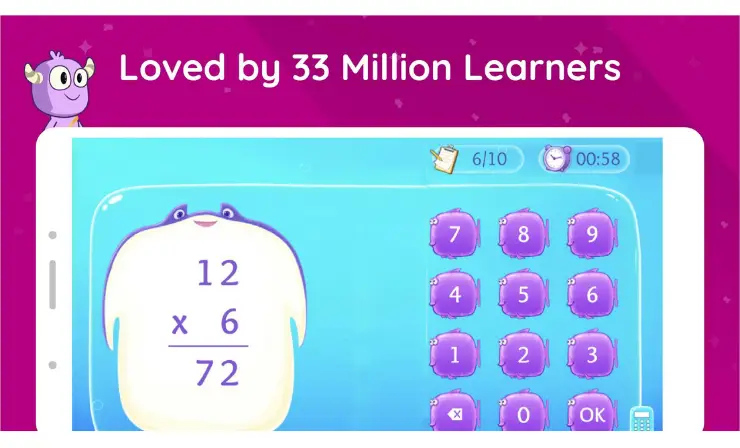
Rules: Players navigate through different levels by solving math problems, and the game adapts to their skill level.
What it develops: SplashLearn isn’t just a game; it’s a portal to personalized learning. Through its dynamic adaptation, the platform hones targeted skills and fosters adaptability in players. As challenges morph to align with a player’s progress, SplashLearn nurtures individualized learning, ensuring that players encounter problems that inspire growth while optimizing their potential for improvement. This adaptability molds an environment where students thrive and skill mastery flourishes, all while reinforcing the joy of learning.
5. Math Jeopardy
Math Jeopardy adds an educational twist to the popular game show. By testing students’ math knowledge across various categories, it transforms learning into an engaging competition. Drawing inspiration from the renowned game show, Math Jeopardy elevates math learning into a captivating competition.
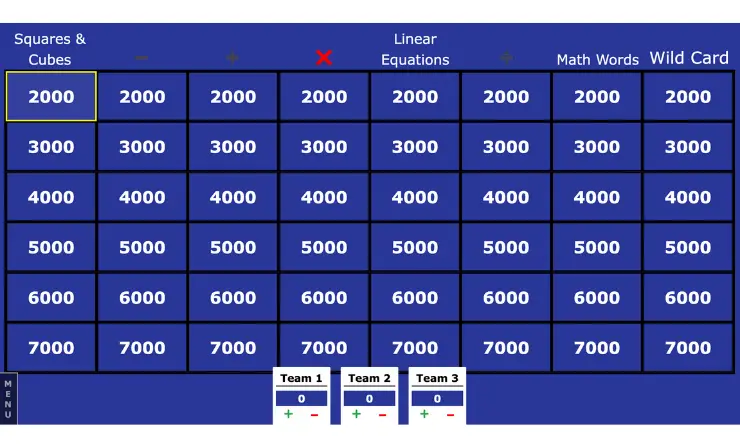
Rules: Players answer math questions to earn points, competing individually or in teams.
What it develops: Quick recall of facts, competitive spirit, and math mastery are cultivated through the excitement of the game. Math Jeopardy isn’t just a game—it’s a stage for quick thinking and spirited competition. The rapid recall of math facts is nurtured as players engage in the exhilarating challenge of answering questions within a time limit.
6. Math Playground
Immerse students in a dynamic realm of mathematical exploration with Math Playground. The platform presents an extensive array of math games that stretch across a spectrum of topics, from foundational operations to the intricate landscapes of algebraic thinking. Each game is meticulously crafted to engage and challenge students, fostering a deepened grasp of mathematical concepts through interactive experiences.
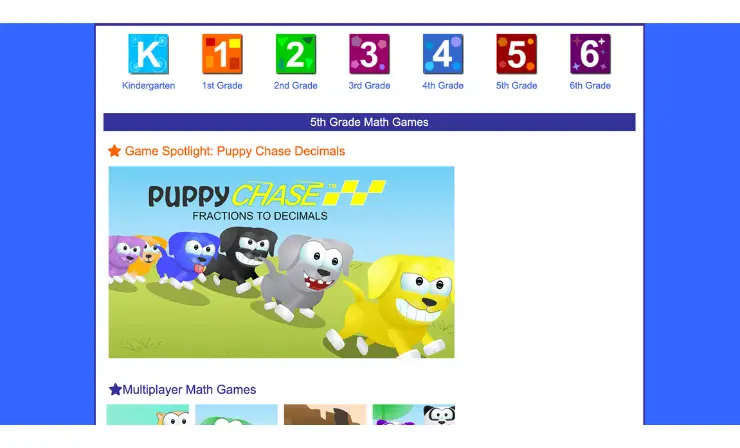
Rules: Players engage in various interactive challenges that promote understanding and application of mathematical concepts.
What it develops: Math Playground transcends mere entertainment, serving as a gateway to mathematical mastery. Through its interactive challenges, students cultivate a robust conceptual understanding, laying the foundation for more advanced mathematical pursuits. These hands-on activities also nurture problem-solving skills, allowing students to approach mathematical puzzles with confidence and creativity. Moreover, the platform contributes to the refinement of mathematical fluency, enabling students to engage with mathematical concepts effortlessly and with precision.
7. Math Lines
Math Lines is more than a game; it’s a strategic mathematical adventure that challenges students to embark on a quest of number mastery. By merging the realms of math and strategy, Math Lines encourages players to exercise their mental math abilities, devise astute strategic plans, and foster an acute number sense.
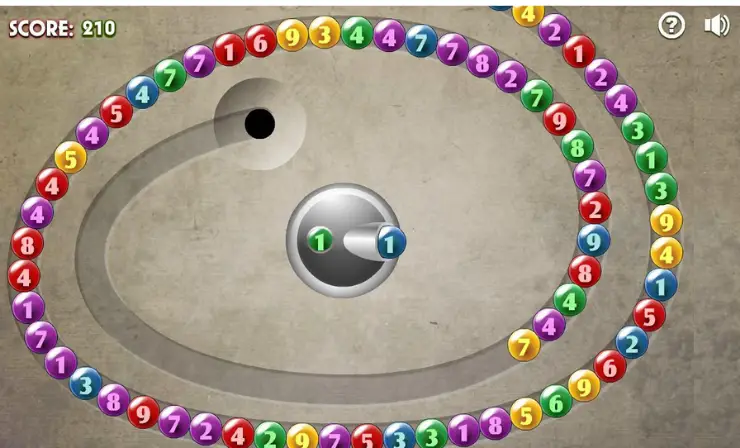
Rules: Within the realm of Math Lines, players engage in a captivating gameplay mechanic. Armed with numerical ammunition, they fire numbered balls towards their targets, aiming to create pairs that add up to a specific number. The rules embody a dual-purpose, as players must not only exercise precision in their shots but also strategically eliminate balls from the screen.
What it develops: As players take aim in Math Lines, they simultaneously refine an array of essential skills. Mental math capabilities are heightened as players swiftly calculate the sum of potential pairs, leading to precise shot selections. Strategic planning comes to the forefront as players deliberate on optimal trajectories to eliminate balls effectively. In the process, a nuanced number sense is nurtured, empowering players to grasp numerical relationships intuitively.
8. Math Quest
Embark on a math-driven odyssey with Math Quest, where math practice metamorphoses into an exhilarating adventure. In this captivating world, students wield their math prowess to conquer challenges, vanquish foes, and progress through intricate levels. Math Quest transforms the act of solving math problems into a heroic journey that sharpens problem-solving skills under the pressure of adventure.
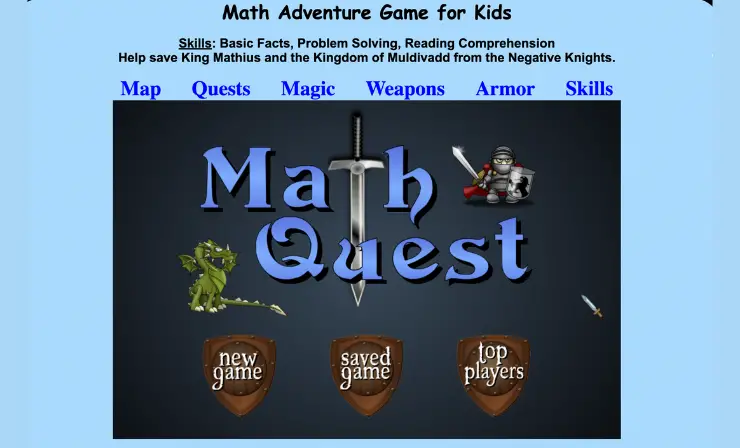
Rules: Within the realm of Math Quest, players are not just solving equations—they are navigating an expansive universe filled with challenges. Math skills are the key to unlocking success, with each correct answer serving as a weapon to overcome obstacles and adversaries. The rules dictate a strategic dance, where mathematical proficiency becomes the driving force behind progression.
What it develops: Math Quest takes students on a voyage of skill enhancement. Problem-solving capabilities are honed under the pressure of the quest, enabling students to adeptly tackle challenges with poise and efficiency. Math proficiency flourishes as students apply theoretical concepts to real-world scenarios within the game. Moreover, Math Quest is a testament to perseverance, nurturing the determination to persist and conquer, even in the face of challenging situations.
9. Number Munchers
Embark on an arcade-style mathematical adventure with Number Munchers, where students navigate a grid in pursuit of numbers that align with specific criteria. The mission is clear: munch on numbers that correspond to a given factor or multiple. As numbers are devoured, multiplication and division skills come to life in a dynamic and engaging way.
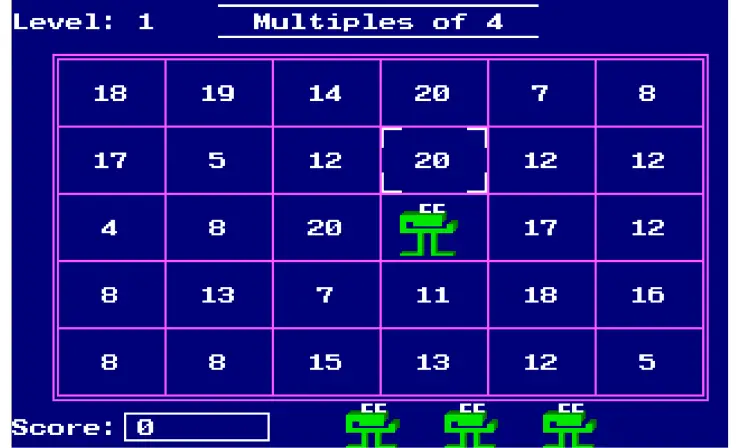
Rules: Players must munch on numbers that match the target factor or multiple, practicing multiplication and division.
What it develops: Number Munchers isn’t just about devouring digits; it’s about fostering mathematical mastery. Multiplication and division skills thrive as players strategically munch on numbers that align with given factors or multiples. The gameplay fuels quick decision-making as players scan the grid for eligible numbers, enhancing mental agility in the process. As students tackle these numerical challenges, they cultivate a deeper understanding of multiplication and division, all while honing essential cognitive skills.
10. Buzzmath
Buzzmath offers a diverse array of interactive math activities, assessments, and games aligned with the curriculum. By solving math problems across various topics, students achieve concept mastery and skill improvement.
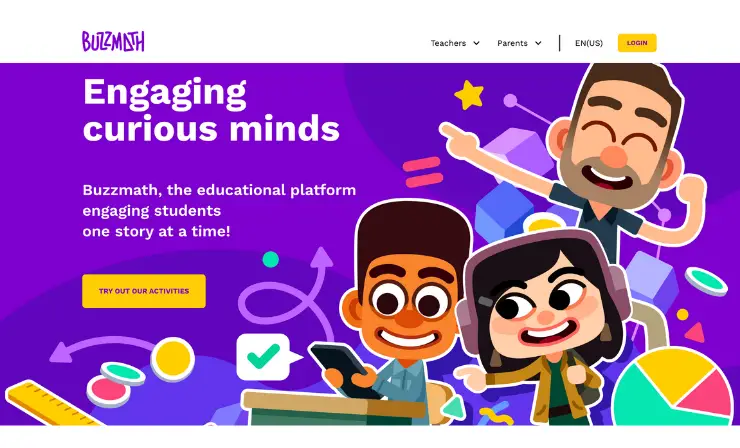
Rules: Players engage in interactive math challenges, earning rewards and progressing through different levels.
What it develops: it’s a dynamic classroom that cultivates comprehensive mathematical proficiency. Through a spectrum of activities, students achieve mastery over concepts, ensuring they grasp the intricacies of various mathematical topics. Skill improvement is more than a promise; it’s an outcome as students navigate through challenges, their abilities evolving with each solved problem. With Buzzmath, a well-rounded math foundation is forged, setting the stage for future mathematical endeavors.
11. Math Man
Immerse yourself in the captivating fusion of classic gaming and mathematical challenges with Math Man. This ingenious game seamlessly blends the excitement of Pac-Man with the thrill of math challenges. As students navigate through a maze, their mission is to devour ghosts by selecting answers that match the target number, sparking an exhilarating journey that hones addition, subtraction, and strategic thinking skills.
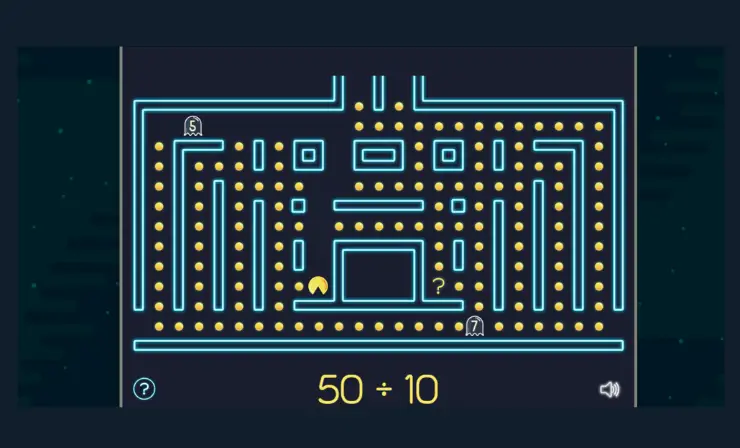
Rules: Players maneuver around the maze, consuming ghosts with answers that match the target number.
What it develops: Math Man transcends the realm of mere entertainment by fostering vital mathematical skills. Addition and subtraction skills flourish as players engage with math in a dynamic, hands-on manner. Strategic thinking takes center stage as players navigate the maze, considering each move’s implications while pursuing victory. The game becomes a conduit for skill enhancement, propelling students to engage with mathematical challenges with both agility and strategic foresight.
12. Algebra Puzzle
Algebra Puzzle is a game that presents students with intricate algebraic equations, urging them to solve for the elusive values of variables. By deftly manipulating numbers and variables to unveil the solutions, students engage in a cognitive dance that elevates their algebraic thinking and sharpens their critical analysis skills.
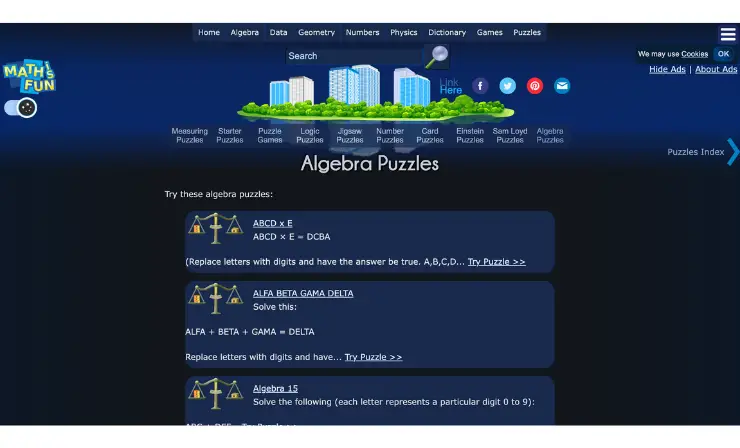
Rules: Players manipulate numbers and variables to solve equations, progressing through levels by cracking algebraic challenges.
What it develops: Algebra Puzzle isn’t just a game—it’s a conduit for honing fundamental algebraic skills. Algebraic thinking blooms as students immerse themselves in the puzzle-solving process, piecing together equations and variables to unlock hidden values. The act of solving equations transcends mere arithmetic—it becomes an exercise in critical analysis, fostering the ability to dissect complex problems and arrive at elegant solutions.
13. Monster Math
Monster Math combines math practice with an exciting storyline. This ingenious game weaves an enchanting narrative, compelling students to answer math questions in order to cast spells and conquer monsters. Through this gamified adventure, students embrace the pursuit of math accuracy, speed, and motivation while being immersed in a captivating world of learning.
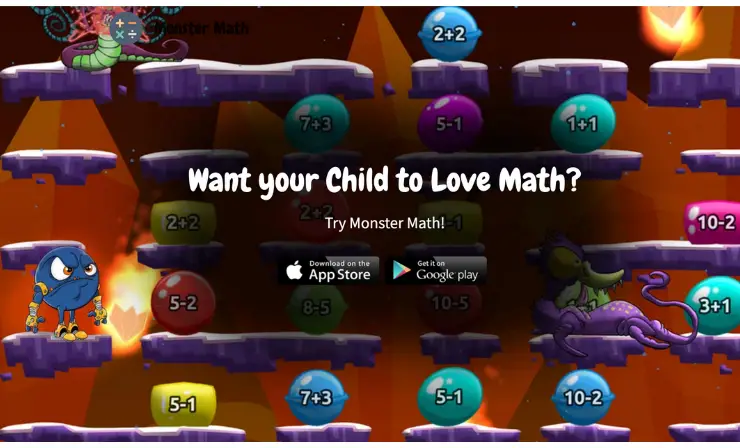
Rules: Players answer math questions to cast spells and defeat monsters, progressing through different levels.
What it develops: Monster Math transcends traditional math practice by igniting a fire within for mathematical excellence. Math accuracy flourishes as players strive to answer questions with precision to cast effective spells. Speed becomes a virtue as players race against the clock, fostering quick thinking and response. Moreover, the captivating storyline becomes a source of motivation, driving students to conquer challenges with unwavering determination.
14. Arithmetic
Embark on a mathematical journey with Arithmetic, an online game designed to foster equation-building skills. Questions appear at the base of the screen, beckoning players to construct various equations. Whether tackling problems individually, in pairs, or within groups, students engage in a virtual mathematical adventure.
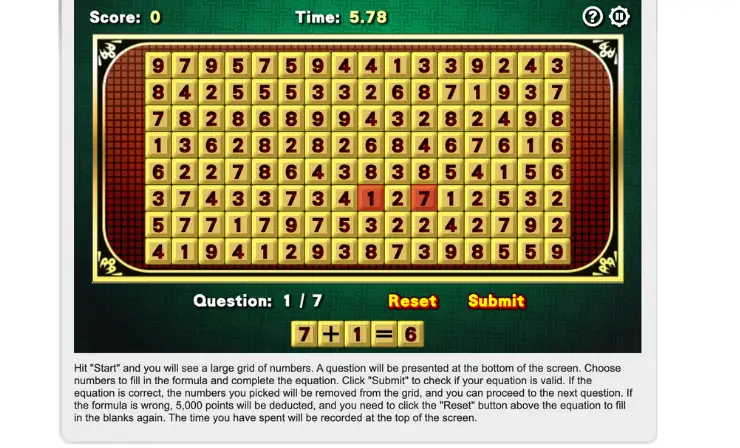
Rules: Players select and arrange numbers and operations to form equations that fulfill the given criteria. The game encourages strategic thinking and mathematical collaboration. Correct equation construction advances players through levels, with increasing complexity and challenges.
What it develops: Arithmetic cultivates students’ equation-building skills, strengthening their numerical fluency and problem-solving abilities. The collaborative nature of the game nurtures teamwork and effective communication.
15. Decimal Detective
Enter the realm of intrigue as 5th graders become Decimal Detectives. Armed with hints and guided by reasoning skills, players embark on a mission to uncover decimal numbers hidden within the game’s challenges.
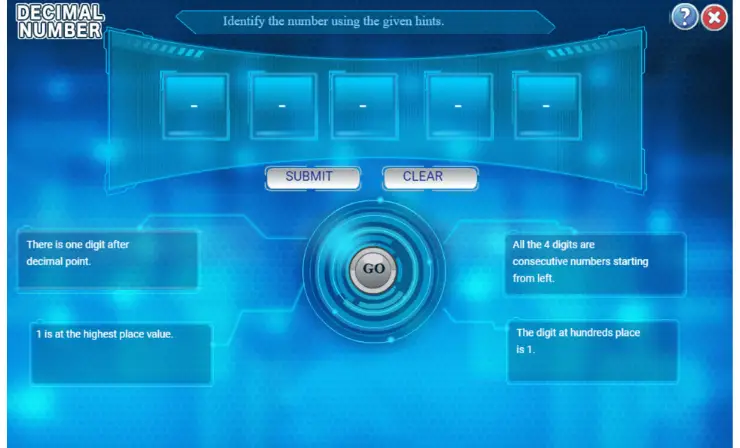
Rules: Players navigate through clues and logical deductions to unveil hidden decimal numbers. By applying critical thinking and reasoning, they gradually decipher the clues to uncover the concealed decimals.
What it develops: Decimal Detective sharpens students’ logical reasoning and critical thinking abilities. Through deciphering clues, players hone their deductive skills, fostering a deeper understanding of decimals in a captivating and engaging context.
16. Sushi Fractions
Experience fractions in a delectable context with Sushi Fractions. In this culinary adventure, players create sushi platters based on specific orders from restaurant customers, learning about various fractions along the way.
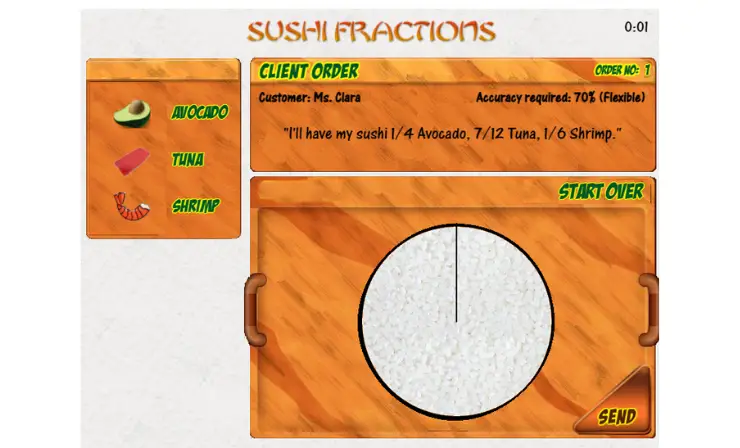
Rules: Players assemble sushi platters by combining different fractional parts, adhering to customer orders. The game challenges players to use fractions to craft visually appealing and delicious virtual sushi dishes.
What it develops: Sushi Fractions immerses students in a practical application of fractions, enhancing their understanding of fractional concepts and their ability to work with fractional parts. The game fosters a hands-on approach to fractions through creative problem-solving.
17. Fruit Splat Multiplication
Fruit Splat Multiplication infuses multiplication practice with interactive gameplay. By selecting correct answers to multiplication questions, students splat the corresponding fruit, enhancing multiplication skills, quick decision-making, and accuracy.
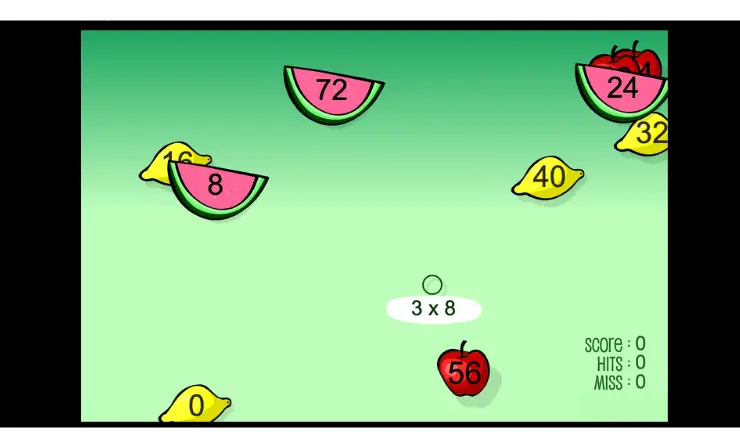
Rules: Players choose the correct answer to multiplication questions, splatting fruits and practicing multiplication.
What it develops: Multiplication practice, quick decision-making, and accuracy are refined as students engage in fruit-splatting fun.
18. Volume of Solids
Explore the realm of geometric calculations with Volume of Solids. As one of the more advanced mathematical concepts, volume calculation takes center stage in this game.
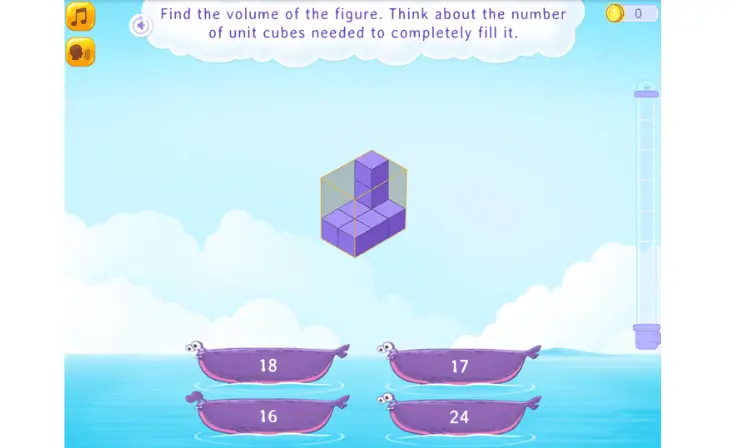
Rules: Players navigate geometric shapes, calculating their volumes by multiplying height and width. As challenges increase, players may employ various formulas to calculate volumes accurately, deepening their grasp of geometric concepts.
What it develops: Volume of Solids nurtures students’ understanding of geometric calculations, enhancing their ability to calculate volume by manipulating dimensions. The game cultivates problem-solving skills and a strategic approach to complex mathematical concepts.
19. Math Bingo
Math Bingo takes the classic game to the educational realm. By solving math problems to mark numbers on their bingo cards, students make connections between gameplay and mathematical concepts.
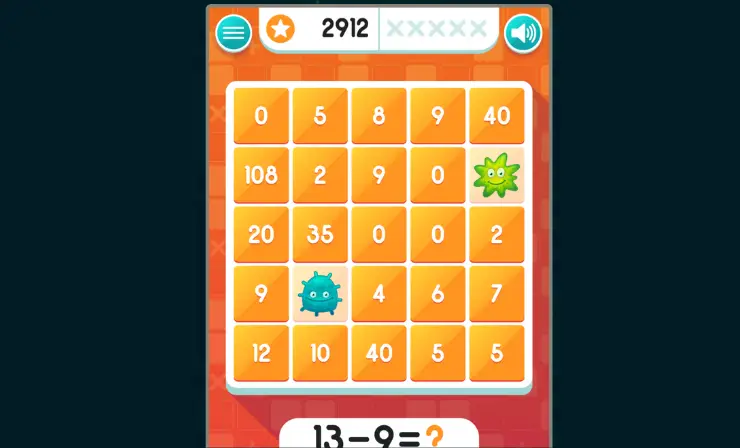
Rules: Players solve math questions, striving to complete rows or columns to achieve Bingo.
What it develops: Quick calculations, pattern recognition, and mental math proficiency are strengthened as players strategize to complete their Bingo cards.
Energize your classroom with active learning! Explore this video for a treasure trove of 10 invigorating ideas and games that seamlessly blend physical activity into your math lessons. Discover dynamic ways to engage students and infuse your math classes with movement and excitement.
Additional Resources
- Math Games For Grade 5 Without Screens
- National Council of Teachers of Mathematics
- PBS LearningMedia Math Games
Conclusion
Math games for grade 5 serve as powerful tools to make learning an enjoyable experience. By turning complex math concepts into interactive challenges, these games empower students to not only excel in mathematics but also develop essential life skills.
- Overview of 22 Low-Code Agencies for MVP, Web, or Mobile App Development - October 23, 2024
- Tips to Inspire Your Young Child to Pursue a Career in Nursing - July 24, 2024
- How Parents Can Advocate for Their Children’s Journey into Forensic Nursing - July 24, 2024
